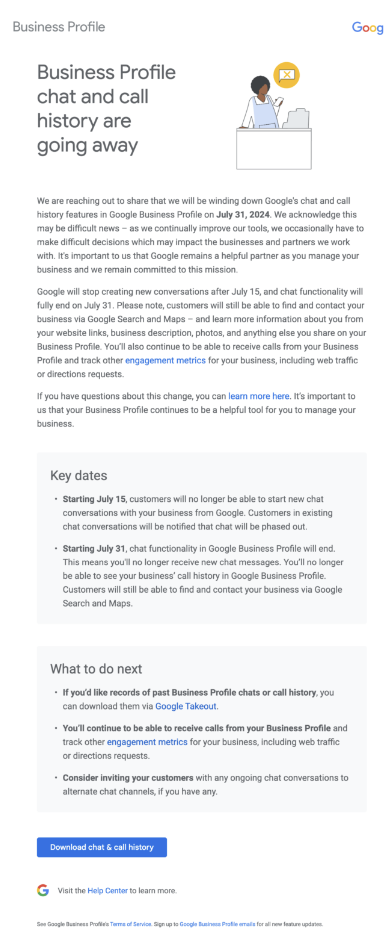What Are AI Agents? And Why Are They Critical to Local Marketing Success?
Local Memo: A Holiday Weekend Google Leak That Uncovers the Algorithm’s Secrets
Local Memo: A Holiday Weekend Google Leak That Uncovers the Algorithm’s Secrets
In this week’s post, learn about a Google search algorithm data leak that challenges SEOs preconceived thoughts and some of Google’s prior statements; Google retiring GBP chat and call history in July; Local Packs are decreasing in share of voice.
Uncovering the Secrets of Google’s Algorithm
The News
After a relaxing holiday weekend, the SEO community experienced a significant shakeup when Rand Fishkin, Co-Founder of Moz, current Co-Founder and CEO of Sparktoro, and long-time SEO maven, announced on LinkedIn that he had received leaked Google API documentation that appeared to contain “modules and features used in the search engine’s indexing and ranking systems.”

This has been an industry-shattering moment, as the documentation appears to dispute much of what Google has communicated to SEO professionals over the years. The deep dive into these findings has many questioning the trustworthiness of Google’s statements.
Rand, in partnership with Mike King at iPullRank, both published excellent summaries of this update. Below are a few stand-out insights we felt were relevant to our SOCi community:
Clicks to Website Matter
One of the more notable findings in the analysis is that clicks are clearly important when considering the authoritativeness of a website for a query. The documentation found within NavBoost, an advanced search ranking algorithm that aims to enhance the user experience by improving the quality of search results related to navigation queries, clearly states specific modules built around click signals.
Not only is the user “vote” or click a system of measuring a successful search experience, but Google also appears to store which result had the longest click during the session.
As stated in Mike King’s article, “So, it’s not enough to just perform the search and click the result, users need to also spend a significant amount of time on the page.”
Maybe It’s not “Domain Authority,” but Authority Score is Very Much a Thing
The documentation clearly shows evidence of “siteAuthority” within the Compressed Quality Signals. This means that this “Authority Score” of sorts can help determine your relevance for a specific query.
There has been a lot of pushback lately from the community regarding smaller websites/authors and their difficulty appearing in search results. It’s becoming increasingly clear that Google prioritizes the big players in search results.
The authority of your brand and your domain absolutely impacts your position in search results and your ability to rise in the ranks.
Navigational (Local) Intent Has a Heavy Weight in Search Results
Rand provided a great example highlighting this topic:

Working in the local space, we often try to tell customers that “my experience in Pittsburgh won’t reflect your search experience in Dallas,” but this revelation takes things a step further. This navigational intent focus is considering the reality that a single query may have different intentions based on navigational relevancy, so it’s possible for content writers to target regions on their websites.
Title Tag Optimization is Alive and Well
Thanks to a finding called titlematchScore — it’s safe to assume that there is still significant value associated with how well a page title matches the query string you’re targeting.
SOCi has seen this countless times with its own optimization strategies for local landing pages. Effective strategies for targeting your title tags can vary from adding zip codes (yes, really — we tested it! We were surprised, too), adding seasonally relevant terms, or featuring new services you’d like to target. These findings also reinforce some of the idea that lengthy title tags, while oftentimes suboptimal for driving clicks, can potentially help improve your rankings.
Consistent Dates are Important
This was a fascinating finding, though potentially obvious. If the date of an article/piece of content changes, it’s important to note the date and keep it consistent across all page elements. This includes your XML Sitemap, titles, structured data, and even URLs.
If dates in your URL don’t reflect the same dates across your pieces of content or page elements your page will likely yield a lower performance.
Google Classifies Video-Focused Websites Differently
If more than 50% of your website’s pages contain video content, the site is considered video-focused, and therefore will be treated differently by the algorithm.
What This Means
All of the findings from this leak can be overwhelming to navigate, and more findings will be discussed as the data is dissected over time. For marketers, this has been a huge discovery, and we offer the following advice to folks looking to utilize this data for their businesses:
- Rand Fishkin said it best: “Build a notable, popular, well-recognized brand in your space, outside of Google search.” In this day and age, it’s increasingly important to be well-covered in all areas of marketing. Building brand awareness across both the digital and physical space can reinforce your authority and enhance your relevance in search results. Focus on both social and SEO in your digital efforts to really build your brand.
- Test and learn with tactics that are targeted towards enhancing your visibility and click-through rates in search. Appearing for search results is irrelevant if they aren’t driving traffic to your site. Optimizing for clicks is more important than we originally knew (though, we suspected as such!).
- Create regional demand for your search topics. Regional relevance is a surefire way to appear for targeted queries. Though we still tend to speak in terms of “traditional” and “local” SEO, that divide is quickly blending as regional uniqueness comes to the forefront.
This summary only scratches the surface of complete findings, and certainly more findings to follow, but if one thing is for certain, there’s never a dull moment in the world of SEO.
Google Business Profile – Chat and Call History Going Away
The News
Google recently announced that it will be sunsetting the chat feature and call history for your businesses in search. In an email sent to Google Business Profile (GBP) users, Google stated that on July 15, 2024 customers will lose the ability to start new chats with your business, and on July 31, 2024 the feature, as well as your call history, will be completely turned off.

What This Means
If business owners want to retain their chat and call histories, it will be important to download their information before the sunset date of July 31. After that date, you will no longer be able to access this information, which may be beneficial to your internal CRM systems.
Consider this your warning and reminder!
A Shift in Local Pack Share of Voice
The News
In a recent SERP feature analysis conducted by STAT Analytics, and reported in last Friday’s Whiteboard Friday by Moz, it was uncovered that Local Packs, despite being the most visible feature in search, are actually decreasing in share of voice (SoV) compared to last year.
Despite an increase in presence on mobile, the measure of how frequently a feature appears in search, the actual visibility, or share of voice, for the feature is down about 2% compared to last year across both desktop and mobile.

What This Means
Although small, this decrease in visibility in the search results may cause some industries to notice decreases in Search Impressions collected by GBPs. “Search Impressions” is the metric GBP collects that indicates an impression specifically collected in Google’s traditional search environment.




